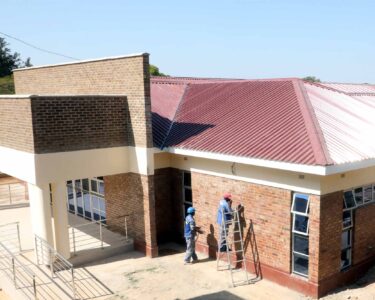There is something phenomenal happening away from the glare of the public at Zhovhe Farm in Beitbridge. The Marema family, through its holding company, TopPick Investments, has poured in over US$5.5 million into its citrus plantation that is poised to become one of Matabeleland South Province’s flagship projects.
The figures are mind-boggling. Hear this – the farm sits on 2,000 hectares, 640 hectares of which are under not less than 185,000 citrus trees. There are 17 centre pivots drawing water from a 7km pipeline from Zhovhe Dam. Work is currently underway to expand the citrus plantation by an additional 400 hectares to bring the total hectarage to a whopping 1,040 hectares.
And now hear this – this insanely-massive and highly-integrated citrus plantation is irrigated via Bluetooth. Yes, Bluetooth! Our Editor-in-Chief, Munyaradzi Huni, visited Zhovhe Farm and was blown away by its size and the latest technology in use there.
When the Brick by Brick magazine team visited Zhovhe Farm, the idea was to spend an hour or two there before proceeding to Shashe Irrigation Scheme. How wrong we were! As soon as the team drove into the farm, it was apparent that this was going to be one long day. On hand to welcome us was the manager, Mthulisi Sibanda, whose first words were:
“I can see you are really fascinated by our citrus trees and so let me start by talking about them. We planted the first 30,000 trees in April 2021, followed by the second batch of 55,000 trees in November 2021. The third batch, comprising 22,000 trees, was planted in February 2022. Batch number four with 78,000 trees was planted in September 2022.
“Zhovhe Farm has its own nursery, on which you will find four varieties of citrus trees — Bennie Valencia, Turkey Valencia, Midnight Valencia and Lemon, all imported from neighbouring South Africa. Bennie Valencia is a late-maturing variety while Midnight, Turkey and Lemon mature early.
“People wonder how we manage to plant so many trees. The answer is simple. We set ourselves high targets to achieve within stipulated timeframes. We employ up to 400 people, mostly women and youths, from the surrounding communities. Most of them are casual workers, who are with us for about two months at a time. The number of workers recruited increases at planting time and when laying irrigation pipes and drip system.
Zhovhe Farm draws its irrigation water from Zhovhe Dam on the Mzingwane River with a capacity of 133 million cubic metres.
“We use macrojet 16 to irrigate the farm. We have a wireless irrigation controller that has a base unit that is responsible for 24/7 execution of preconfigured watering, scheduling and soil state monitoring, among other functions. Every section of the farm has a filter. Per day we can water two or three sections of the farm using Bluetooth.
In layman’s terms, Bluetooth is a wireless radio communication between the farm manager’s smartphone and a micro-controller. An automated irrigation sensor captures and processes digital images of the soil nearby the root zone of the crop and estimates the water content.
Bluetooth collects information from sensors and sends predefined user orders to actuators that “command” the water sprinkler to go off. The data is collected by moisture sensors.
However, there is more to Zhovhe Farm than just thousands of citrus trees that stretch as far as the eye can see. Says Sibanda: “We are also into wheat, maize and sugar beans. The bulk of the wheat and maize is delivered to the Grain Marketing Board (GMB), while the remainder is processed by our own milling plants right here on the farm. The on-farm milling plants were commissioned in 2019.
“Thanks to our in-house milling plants, we now supply mealie-meal and flour to local shops and nearby boarding schools. In addition, we have established a chain of bakeries to sell our own bread and confectioneries at the various shopping centres dotted around Beitbridge.
“Zhovhe Farm has also invested heavily in livestock. For the record, we have 1,200 cattle, 770 goats and 590 sheep. Our cattle pens measure 60 metres by 40 metres and we have 44 of them, with each pen accommodating no less than 200 cattle. The long-term plan is to have 5,000 cattle, subject to the availability of more land.”
Says Sibanda: “Many people are under the impression that Zhovhe Farm is owned by a white farmer, but the Marema family are black people, like you and me, who have a strong passion for farming. The colour of one’s skin does not matter when it comes to farming. All you need is focus. And what is happening here is clear proof that a black person can be a very successful farmer,” adding:
“What makes me happy is the fact that the local community are the biggest beneficiaries of this rapidly expanding enterprise. To start with, 90 percent of our workforce are from this community. They come from areas such as Ndambe, Zezani and Kwalu. The Marema family has created thousands of jobs at the farm and its ancillary businesses. Youths in this area now prefer to work here rather than risk life and limb crossing over to South Africa. The pay and working conditions here are second to none.
“However, there is one big challenge — stocktheft. We are working hard to improve our security system and hope that cattle rustling will soon be a problem of the past.”
Managing such a highly-integrated farm with so many workers and using the latest technology is no stroll in the park. In fact, one would be tempted to think that Sibanda holds a PhD in agriculture. Far from it. He learnt everything he knows about farming on the job. In his own words:
“I only did Agriculture as a subject at O-Level after which I worked for a farmer called Amara in Bulawayo for about three years. That is the ‘university’ at which I graduated with honours in livestock and crop farming.
“Despite my lack of formal training, I am well versed with all the farm machinery and equipment at my disposal. I am also good at managing both people and time. Above all, I am very passionate about my job. For me, it’s work, work and more work. I don’t have time to loiter. Seeing this farm expanding and growing gives me the greatest satisfaction.”
The Zhovhe farm manager has some words of advice for those who look for salvation in office jobs. “I hear some people saying things are tough in Zimbabwe, but I think this is mainly to do with the mindset. Some people are used to life on easy street. They don’t want to get their hands dirty. They think farming is a dirty job but the truth is, farming is where all the money is.
“Although the Marema family is already rich, they are still investing in land. Why? Because with land, you can’t go wrong. Zimbabweans need to change their mindset.”
When asked what assistance he expected from the Second Republic, Sibanda was unequivocal: “We need more land to put more centre pivots and expand the farm. Our long-term target is to put 2,000 hectares under citrus. Come back in five years’ time and you will not recognise this farm. It is going to be bigger than it is now and we will be producing top quality fruits and processing them here. Zhovhe Farm is going to transform Matabeleland South in ways that will have the doubting Thomases scratching their heads. Our vision is to put Zimbabwe back on the world map in terms of citrus production.”
His parting remarks? “We need more land to meet the requirements of our expanding operations,” was all Sibanda was prepared to say by way of conclusion to a fruitful tour of Zhovhe Farm.
“Makhado will never be the same again!”
But that is not all. The Marema family has also poured in about US$2.5 million to build a state-of-the-art one-stop complex at Makhado, along the Bulawayo-Beitbridge Highway. The complex boasts conference facilities, a 28-room lodge, beauty salon, service station, internet café, motor vehicle workshops, butchery, bakery, supermarket and hardware store.
Makhado lies on the border of Gwanda and Beitbridge districts in Matabeleland South. It is within 100km of Beitbridge town to the south and an equal distance within Gwanda to the north.
Surrounded by farms and safari hunting areas, it has traditionally served as a largely sleepy drive-by settlement than a drawcard for any activity that may bring multitudes together. Motorists and other travellers pulled up for meals, mainly starches with goat meat or spring chicken, and to pick up fresh farm produce.
However, Makhado, which also links Maranda towards Masvingo to the east, has undergone a huge facelift, which is set to rewrite the surrounding settlements story.
But thanks to the Marema family’s vision, there is no doubt Makhado will never be the same again.
Then-Vice President Kembo Mohadi officially opened the complex in the last week of November 2020, with scores of people gathering to witness the awakening of a sleeping giant.
Also in attendance was the Minister for Matabeleland Provincial Affairs and Devolution, Hon Abednico Ncube; Minister in the VP’s Office, Hon David Marapira; Senator Tambudzani Mohadi; Ambassador Maboyi; and the permanent secretary in the Ministry of Tourism and Hospitality Industry, Munesu Munodawafa.
Addressing the guests, then-VP Mohadi said it was important for other businesspeople at Makhado to upgrade their properties to maintain the momentum set by TopPick Investments. He said the Government had also refined its tourism development and rural development strategies to boost economic growth as envisaged in the country’s economic blueprint, Vision 2030.
“The project we are commissioning today is a testimony of the growing interest by our own local investors to participate in the lucrative tourism sector. This has been enabled and accelerated by the improved business environment that the government of Zimbabwe and Second Republic, under the able leadership of President Mnangagwa, continues to champion across all the economic sectors, tourism being one of them,” said the Zanu-PF Second Secretary, who hails from Matabeleland South.
He said the recently launched National Development Strategy 1 (NDS1) will employ bold and transformative measures and continued international re-engagement efforts leveraging on the national competitive advantages, among them the country’s bountiful natural resources.
Speaking at the same function, Minister Ncube said: “This project will not only change the landscape of the Makhado area, but also bring the much-needed services along the Beitbridge-Bulawayo Highway, which is a very critical and busy road in the province.
“TopPick Investments has invested a lot in the province in areas including funeral parlours, farming, accommodation, and fuel service stations while contributing to employment creation, which is one of the government’s top priorities,” said the minister.
He said the Makhado complex and lodge would indeed transform the province’s tourism sector, which has been hamstrung by the lack of requisite accommodation.
TopPick Investments chief executive officer, Danisa Moyo, said the new lodge and complex were strategically positioned along the highway and the heart of tourism facilities in Gwanda and Beitbridge districts.
ON A LIGHTER NOTE: The three-man Brick by Brick magazine team went to Zhovhe Farm united, but came out divided. In the “Blue Corner” was Team Impala comprising the managing editor, Baffour Ankomah, and photographer Tawanda Mudimu. Editor-in-chief Munyaradzi Huni was the sole occupant of the “Red Corner”. This unfortunate division came about following the generous offer by Sibanda to hunt impala for the pot and braai stand.
While not exactly a vegetarian, Huni was not for the idea of spilling innocent blood (human or animal), but Ankomah and Mudimu vowed that they would not leave Matabeleland South without a souvenir in the form of impala meat. It took all of two days to bag the highly agile and elusive impala. But it was worth the wait. Even the “reluctant hunter” Huni found it hard to resist the delicious taste of impala meat. Kudos to Mthulisi Sibanda and Team Impala!





